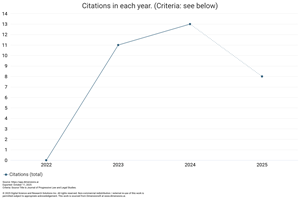Controversy of Adopted Children Status and Foster Father in the Marriage Process Based on Islamic Law Perspective
DOI:
https://doi.org/10.59653/jplls.v1i02.100Keywords:
Adopted Children, Adopted Father, Islamic LawAbstract
This paper seeks to explain the controversy regarding the status of adopted children and adoptive fathers in a marriage procession by using a normative juridical approach, it is concluded that the status and position of adopted children in the Islamic legal system does not break the kinship relationship between the adopted child and his biological parents so that the adoptive father does not become the guardian of his adopted child except through the mandate given by the child's biological parents. This study uses a normative approach and method, conducted by examining theoretical matters concerning Islamic legal norms and positive law. Primary sources are the Koran, hadith, Compilation of Islamic Law, and Marriage Laws. Secondary sources refer to the opinions of experts, as well as references related to the issues raised. The results of this study explain that the validity of the marriage guardian for adopted children is to remain with the lineage guardian if his whereabouts are still known and cannot be replaced by anyone except the lineage guardian is unknown, then the marriage guardian can be replaced by a judge's guardian. However, if in practice the adopted child is not known who the biological parents are, then the adopted daughter's marriage guardian is the adoptive father, or if the adoptive father receives a mandate from the child's biological father, then the marriage is valid as stated by al-Bahuti
Downloads
References
Abdurrahman, (2004). Kompilasi Hukum Islam di Indonesia, Akademika Pressindo, Jakarta.
Al-Furqaan, M., & Mustafa, M. Al. (2023). Status of Adopted Child Turned into Mahram According to Syafi’i Fiqih. Al Mashaadir : Jurnal Ilmu Syariah, 3(2). https://doi.org/10.52029/jis.v3i2.92
Andi, Syamsu Alam, (2008). Hukum Adopsi Anak menurut Hukum Islam, Prenada Medi, Jakarta.
Asadullah, M. N., Islam, K. M. M., & Wahhaj, Z. (2020). Child marriage, climate vulnerability and natural disasters in coastal Bangladesh. Journal of Biosocial Science. https://doi.org/10.1017/S0021932020000644
Departemen Agama RI, (1999). Al-Qur’an dan Terjemahnya, Karya Toha Putra,Semarang.
Djawas, M., Achyar, G., Arifin, N. B., Reza, M., & Yakub, B. U. (2022). The Legal Position of Children of Incest (A Study of Madhhab Scholars and Compilation of Islamic Law). Samarah, 6(1). https://doi.org/10.22373/sjhk.v6I1.11904
Djubaidah, Neng, (2010). Pernikahan Tercatat dan Tidak Tercatat, Sinar Grafika, Jakarta.
Echold, John,M., Hassan Sadly, (1986). Kamus Bahasa Inggris, PT Gramedia, Jakarta.
Kalsel, kemenag.go.id, Adoption and The Complexity of Marriage Registry
Musthofa, (2008). Children Adoption The Authority of Religious Court. Prenada Media, Jakarta.
Muttaqin, Yazzid, The Prohibition of leaning lineage towards foster parents, NU Online.
Nurliana, N., Ulya, M., Salmah, S., & Nurhasanah, N. (2023). Second Puberty in Marriage Islamic Family Law Perspective. International Journal of Islamic Thought and Humanities, 2(1). https://doi.org/10.54298/ijith.v2i1.55
Pasha, Mustafa Kamal, et. al., (2003). Fikih Islam Sesuai dengan Putusan Tarjih, Citra Karsa Mandiri, Yogyakarta.
Saleh, H.E Hassan, et. al., (2008). Studi Fikih Nabawi dan Fikih Kontemporer, Rajawali Pers, Jakarta.
Sabiq, Sayyid, (2010). Fikih Sunnan Terjemahan, Pena Pundi Aksara, Jakarta.
Sabreen, M. (2021). Guardianship of property in islamic law. In Hamdard Islamicus (Vol. 44, Issue 1).
Situmorang, Victor, M., (1991). Aspek Hukum Akta Catatan Sipil di Indonesia, Sinar Grafika, Jakarta.
Soemitro, Irma Setyowati, (1990). Aspek Hukum Perlindungan Anak, Bumi Aksara, Jakarta.
Soemiyati, Ny. (2007). Hukum Perkawinan Islam dan Hukum Perkawinan, Liberty, Yogyakarta.
Sujono, I. (2022). Legal Review of Marriage for Divorced Women Outside the Religious Courts. International Journal of Islamic Thought and Humanities, 1(1), 1–16. https://doi.org/10.54298/ijith.v1i1.10
Syaltut, Mahmud, (tt). al-Fatawa, Daarul al-Qalam, Mesir.
Syarifuddin, Amir, (2003). Garis-garis Besar Fikih. Kencana, Jakarta.
Syarifuddin, Amir, (2009). Islamic Marriage Law in Indonesia (Between Fiqh Munakahat and Marriage Law), Kencana, Jakarta.
Utomo, Setiawan Budi, (2003). Fiqh Aktual; Jawaban Tuntas Masalah Kontemporer, Gema Insani, Jakarta.
Zaini, Muderis, (1985). Adopsi, Bina Aksara, Jakarta.
Zuhdi, Masfuk, (1987). Masaail Fiqhiyyah, Toko Gunung Agung, Jakarta.
بوهدة, غ., بن سيتريس, م., & بن سايح, س. (2020). الولاية في الزواج: مقاصدها في الشريعة وتحدياتها المعاصرة (Guardianship in the Marriage: Its Objectives in the Shariah and Contemporary Challenges). Journal of Islam in Asia (E-ISSN 2289-8077), 17(3). https://doi.org/10.31436/jia.v17i3.996
Downloads
Published
How to Cite
Issue
Section
License
Copyright (c) 2023 Ahmad Fauzi, Darmawan Tia Indrajaya, Ahmad Zikri, Zulfahmi Zulfahmi, Hendri K

This work is licensed under a Creative Commons Attribution-ShareAlike 4.0 International License.
Authors who publish with this journal agree to the following terms:
- Authors retain copyright and grant the journal right of first publication with the work simultaneously licensed under a Creative Commons Attribution-ShareAlike that allows others to share the work with an acknowledgement of the work's authorship and initial publication in this journal.
- Authors are able to enter into separate, additional contractual arrangements for the non-exclusive distribution of the journal's published version of the work (e.g., post it to an institutional repository or publish it in a book), with an acknowledgement of its initial publication in this journal.
- Authors are permitted and encouraged to post their work online (e.g., in institutional repositories or on their website) prior to and during the submission process, as it can lead to productive exchanges, as well as earlier and greater citation of published work (See The Effect of Open Access).
























